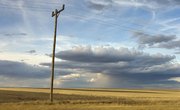State and federal laws protect the productive use of property by ensuring that it can't be landlocked – that is, denied access to a public road – even if it has no direct road access of its own. In most cases, simple remedies keep property from being landlocked. In the case of some federal and formerly federal lands, however, the situation is more complicated.
Read More: What are Property Easements?
Easement by Necessity
An operation of law grants an easement by necessity to landlocked properties that need the easement in order to gain access to a public road. By "necessity," the law means that there can't be another way for the landlocked property owner to gain access. The law also says that the landlocked property, referred to as the dominant tenement, and the property the landlocked owner seeks to cross for road access, referred to as the servient tenement, must have been owned by the same owner at the time the landlocking occurred.
For example, if an owner divided her large property into five smaller ones, one of which was landlocked, and sold the five properties to five different owners, the individual who purchased the landlocked parcel would be entitled to an easement by necessity.
Read More: Is an Easement a Lien?
Patent Deeded Property
The federal government transfers ownership of its land to private individuals with an instrument called a patent deed. The Bureau of Land Management, which operates within the U.S. Department of the Interior, maintains archives of patent deeds that allow researchers to verify title transfers and establish a chain of ownership to trace when and under what conditions a landlock occurred.
Case Law and Patent Deed Easements
In Murphy v. Burch, California's Supreme Court ruled that landlocked property transferred to a private owner with a federal patent deed doesn't automatically qualify for an easement by necessity. In addition to the usual requirements, the court said there must have been congressional intent to grant access via an easement at the time the patent deed was conveyed, but that such intent isn’t implied when the entity conveying title is a sovereignty.
In addition, the court found that necessity doesn't exist if the government had the option to condemn the easement under its right of eminent domain. If the government did have the power to invoke eminent domain, the easement is unnecessary because there was another option for securing access rights.
In the written decision, Baxter, J. stated, "While easements by necessity are grounded in the public policy that property should not be rendered idle due to lack of access, the need for access, by itself, does not entitle a landlocked property owner to burden a neighbor's land when the easement claim must be traced back to a federal patent."
Remedies Under Landlocked Property Law
An individual who owns landlocked property that was, at some point, granted by federal patent, and that doesn't qualify for an easement by necessity, has several other options. She can purchase the servient property, or she may purchase the rights to use it for access to a public street. Purchase of an easement would make the easement part of the dominant tenement that would convey with the property to subsequent owners.
Read More: How to Appraise a Value on a Property Easement
The other option is to purchase a license to use the servient property. A license is granted to an individual rather than to a property, so it terminates when either the tenement owner dies or sells the property. The owner of the servient tenement may revoke the license whenever he chooses.
References
Writer Bio
Daria Kelly Uhlig began writing professionally for websites in 2008. She is a licensed real-estate agent who specializes in resort real estate rentals in Ocean City, Md. Her real estate, business and finance articles have appeared on a number of sites, including Motley Fool, The Nest and more. Uhlig holds an associate degree in communications from Centenary College.

